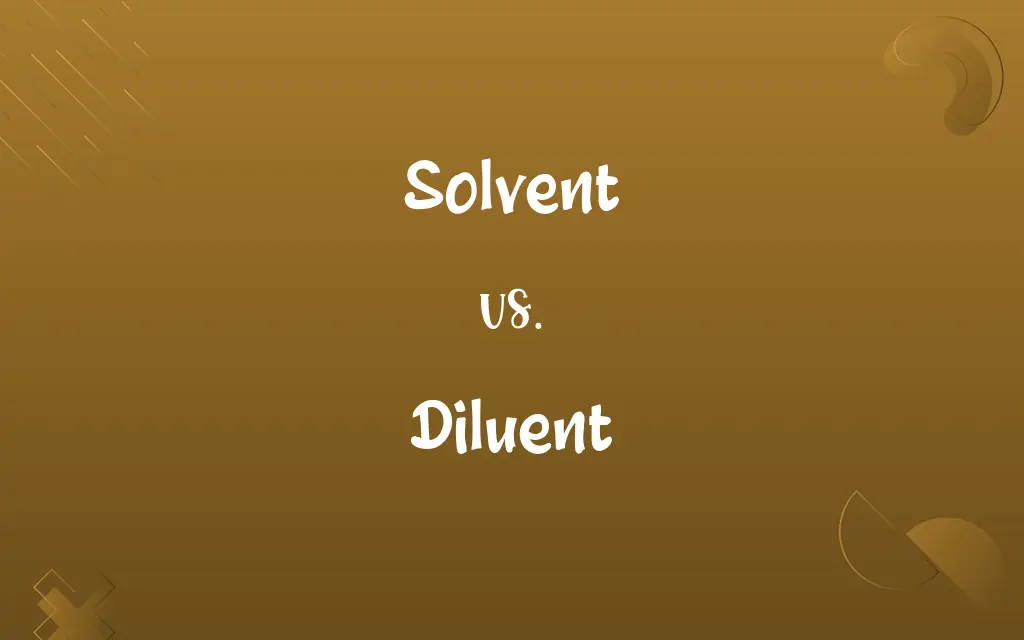Solvent vs. Diluent: Know the Difference

By Shumaila Saeed & Dua Fatima || Updated on March 3, 2024
Solvents dissolve substances, forming solutions, whereas diluents extend volumes without altering chemical properties. Solvents are pivotal in chemical reactions; diluents mainly adjust viscosity or concentration.

Key Differences
Solvents play a critical role in dissolving other substances, creating solutions where the solvent is the majority component. This process is essential in various chemical reactions and formulations, facilitating the interaction of different components. On the other hand, diluents are used to dilute substances, increasing the volume of a solution without significantly affecting its chemical properties. While solvents can change the physical state of a solute (e.g., solid to liquid), diluents are primarily concerned with adjusting the concentration or viscosity of solutions.
Shumaila Saeed
Mar 03, 2024
In many industrial and laboratory settings, solvents are chosen for their ability to dissolve specific materials, such as in paint thinners or pharmaceutical formulations. Their selection is crucial for the effectiveness and efficiency of the product or reaction. Diluents, whereas, are selected based on their inertness and compatibility with the primary substances, ensuring that they do not interfere with the desired chemical or physical properties of the mixture.
Shumaila Saeed
Mar 03, 2024
Solvents can also act as a medium for chemical reactions, not just dissolving substances but also enabling reactants to come into closer contact. This makes them indispensable in synthetic chemistry and materials science. Diluents, on the other hand, are used to reduce the strength of solutions, making handling and application easier, especially in products like paints, adhesives, and cosmetics.
Shumaila Saeed
Mar 03, 2024
Environmental and health considerations are increasingly important in choosing solvents, as many can be toxic or hazardous. This has led to a greater emphasis on finding safer, more sustainable solvents. Diluents, while also subject to similar concerns, are often selected for their lower volatility and reduced environmental impact, emphasizing safety and sustainability in their use.
Dua Fatima
Mar 03, 2024
Both solvents and diluents play roles in adjusting the composition of solutions, their purposes and effects are distinct. Solvents are primarily about dissolving and reacting, whereas diluents focus on volume extension and concentration adjustment without altering the solution's fundamental chemical nature.
Shumaila Saeed
Mar 03, 2024
ADVERTISEMENT
Comparison Chart
Primary Function
Dissolves other substances to form a solution.
Extends volume and reduces concentration without changing chemical properties.
Shumaila Saeed
Mar 03, 2024
Role in Solutions
Majority component that determines the solution's phase.
Added to adjust viscosity or concentration, not necessarily a majority component.
Dua Fatima
Mar 03, 2024
Impact on Chemical Properties
Can participate in chemical reactions, altering the composition of the solution.
Typically inert, aiming to not alter the chemical composition of the mixture.
Shumaila Saeed
Mar 03, 2024
Use Cases
Crucial in pharmaceuticals, paint thinners, and chemical synthesis.
Used in adjusting the strength of paints, adhesives, and pharmaceuticals.
Shumaila Saeed
Mar 03, 2024
Environmental and Health Considerations
Selection often based on toxicity and environmental impact.
Chosen for lower volatility and reduced environmental impact.
Shumaila Saeed
Mar 03, 2024
ADVERTISEMENT
Solvent and Diluent Definitions
Solvent
A substance that dissolves a solute to form a solution.
Water is a solvent for salt.
Dua Fatima
Mar 03, 2024
Diluent
Used to adjust the viscosity of products.
Diluents are added to lubricants to achieve the desired flow properties.
Shumaila Saeed
Mar 03, 2024
Solvent
Plays a key role in determining the properties of a solution.
Ethanol is a solvent that makes alcoholic beverages.
Hifza Nasir
Mar 03, 2024
Diluent
Can extend the volume of a substance without significant changes to its properties.
A diluent in pharmaceuticals can make medicine easier to ingest.
Dua Fatima
Mar 03, 2024
Solvent
Used to dissolve other materials in a chemical process.
Acetone is a solvent used in nail polish remover.
Hifza Nasir
Mar 03, 2024
ADVERTISEMENT
Diluent
Selected for compatibility and safety.
Propylene glycol, a common diluent, is chosen for its non-toxicity in food and drug applications.
Shumaila Saeed
Mar 03, 2024
Solvent
Often a liquid but can be a solid or gas.
Carbon dioxide can act as a solvent in supercritical fluid extraction.
Shumaila Saeed
Mar 03, 2024
Diluent
A substance added to dilute the concentration of solutions.
Water used as a diluent in paint.
Shumaila Saeed
Mar 03, 2024
Solvent
Can participate in chemical reactions.
Methanol serves as a solvent in the production of biodiesel.
Shumaila Saeed
Mar 03, 2024
Diluent
Often inert, not reacting with other components.
Mineral oil acts as a diluent in cosmetic formulations.
Dua Fatima
Mar 03, 2024
Solvent
A substance in which another substance is dissolved, forming a solution.
Shumaila Saeed
Oct 19, 2023
Diluent
(analytical chemistry) A solvent or other liquid preparation used to dilute a sample prior to testing.
Shumaila Saeed
Oct 19, 2023
Solvent
A statement that solves a problem or explains how to solve the problem;
They were trying to find a peaceful solution
The answers were in the back of the book
He computed the result to four decimal places
Shumaila Saeed
Oct 19, 2023
Diluent
Diluting; making thinner or weaker by admixture, especially of water.
Shumaila Saeed
Oct 19, 2023
Solvent
A substance, usually a liquid, capable of dissolving another substance.
Shumaila Saeed
Oct 19, 2023
Solvent
A fluid that dissolves a solid, liquid, or gaseous solute, resulting in a solution.
Shumaila Saeed
Oct 19, 2023
Solvent
(finance) Able to pay all debts as they become due, and having no more liabilities than assets.
Shumaila Saeed
Oct 19, 2023
Solvent
Able or sufficient to pay all just debts; as, a solvent merchant; the estate is solvent.
Shumaila Saeed
Oct 19, 2023
Solvent
A substance (usually liquid) suitable for, or employed in, solution, or in dissolving something; as, water is the appropriate solvent of most salts, alcohol of resins, ether of fats, and mercury or acids of metals, etc.
Shumaila Saeed
Oct 19, 2023
Solvent
A liquid substance capable of dissolving other substances;
The solvent does not change its state in forming a solution
Shumaila Saeed
Oct 19, 2023
Repeatedly Asked Queries
How do solvents differ from diluents in chemical reactions?
Solvents can participate in chemical reactions and affect the outcome, whereas diluents are primarily used to adjust the physical properties of the mixture without participating in the reaction.
Shumaila Saeed
Mar 03, 2024
Why are diluents important in pharmaceuticals?
Diluents are used in pharmaceuticals to adjust dosage strength, enhance stability, and improve the physical properties of drugs for better administration and efficacy.
Dua Fatima
Mar 03, 2024
Can a solvent act as a diluent?
Yes, in some cases, a solvent can act as a diluent when its primary role is to adjust the concentration or volume of a solution rather than to dissolve substances.
Shumaila Saeed
Mar 03, 2024
Are all solvents liquids?
While many solvents are liquids, solvents can also be gases or solids, depending on their application and the substances they are dissolving.
Shumaila Saeed
Mar 03, 2024
What are the environmental concerns associated with solvents?
Many solvents are volatile organic compounds (VOCs) that can contribute to air pollution and have health risks, leading to a push for greener, less toxic alternatives.
Dua Fatima
Mar 03, 2024
How do diluents affect the viscosity of a product?
Diluents can decrease the viscosity of a product, making it thinner and easier to apply or process.
Shumaila Saeed
Mar 03, 2024
What factors influence the choice of a solvent?
Factors include the solvent's ability to dissolve the desired substances, its volatility, toxicity, environmental impact, and compatibility with the process or product.
Shumaila Saeed
Mar 03, 2024
What is a diluent?
A diluent is a substance added to a solution to increase its volume and decrease its concentration, without significantly changing its chemical properties.
Shumaila Saeed
Mar 03, 2024
Can diluents change the chemical nature of a solution?
Diluents are generally selected to not change the chemical nature of a solution significantly, focusing instead on physical properties like viscosity and concentration.
Shumaila Saeed
Mar 03, 2024
What is a solvent?
A solvent is a substance that dissolves a solute, forming a solution.
Dua Fatima
Mar 03, 2024
Why are safety and compatibility important in selecting diluents?
Safety and compatibility ensure that diluents do not react adversely with other components and are safe for intended use, especially in products for human consumption or application.
Shumaila Saeed
Mar 03, 2024
How are diluents used in adhesives?
Diluents in adhesives adjust the concentration and viscosity, ensuring optimal flow and bonding properties without compromising the adhesive's strength.
Dua Fatima
Mar 03, 2024
What makes a good solvent for chemical synthesis?
A good solvent for chemical synthesis effectively dissolves reactants, facilitates interaction, and may participate in the reaction, depending on the desired outcome.
Dua Fatima
Mar 03, 2024
What role do solvents play in paint thinners?
Solvents in paint thinners dissolve the binders and pigments, reducing the viscosity of paint for easier application and cleaning.
Shumaila Saeed
Mar 03, 2024
Share this page
Link for your blog / website
HTML
Link to share via messenger
About Author
Written by
Shumaila SaeedShumaila Saeed, an expert content creator with 6 years of experience, specializes in distilling complex topics into easily digestible comparisons, shining a light on the nuances that both inform and educate readers with clarity and accuracy.
Co-written by
Dua Fatima







































































